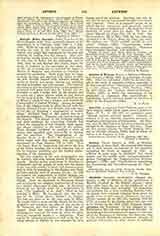www.catholic.com/encyclopedia/maria-antonio-of-vicenza


Click to enlarge
Antonio of Vicenza, MARIA, a Reformed Minorite, b. at Vicenza, March 1, 1834; d. at Rovigno, June 22, 1884. After his ordination (1856) he devoted himself to the study of scholastic authors, especially of St. Bonaventure whose “Breviloquium” he published in a new edition (Venice, 1874; Freiburg, 1881). He also edited the “Lexicon Bonaventurianum”, (Venice, 1880), in which the terminology of the scholastics is explained. His contributions to hagiography include nineteen studies of the lives of saints of the Franciscan Order.
E. A. PACE
Enjoying this content? Please support our mission!Donatewww.catholic.com/support-us

